Contents
Enhanced and Expanded Document Vault
In today's interconnected digital business world, you need a secure, convenient, and efficient way to exchange files with clients and third parties. The enhanced document vault page offers an intuitive interface, robust security, and document sharing directly within Advisor View, eliminating the need to use an FTP server or engage a third-party vendor for file sharing.
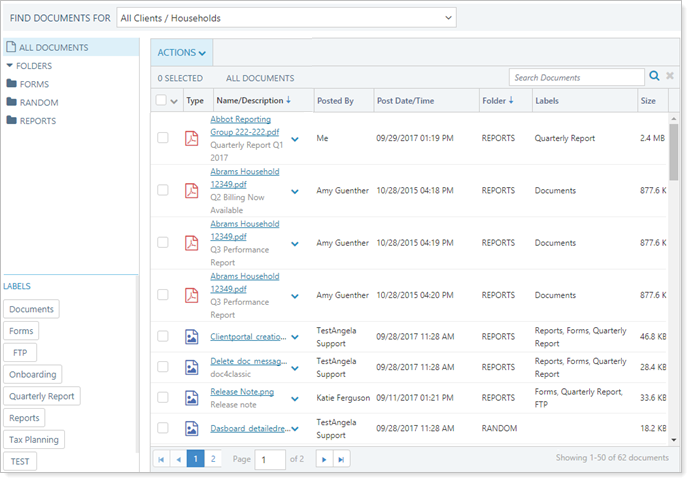
The redesigned document vault page makes it easy to:
Learn More about the Document Vault >>
 Document Vault Folders and Folder Management
Document Vault Folders and Folder Management
Organize your files by folders for high-level document organization. Folders combined with labels give you multi-level file organization—for example, you can have a Taxes folder containing files with a variety of labels.

Folder and Label Assignment Limits
-
Files can only be assigned to one folder at a time. However, there is no limit to how many labels you apply.
-
Clients will see only folders and labels applied to files in their document vault.
The new Manage Folders page, found under Documents, allows you to create, edit, organize, and delete folders.
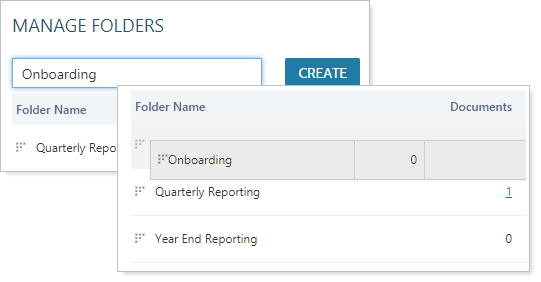
Learn More about Managing Folders >>
 Download Multiple Files at Once
Download Multiple Files at Once
You asked for the ability to download many files at one time from the vault, and we heard you. With the enhanced document vault, you can upload, edit, and download multiple documents at one time.
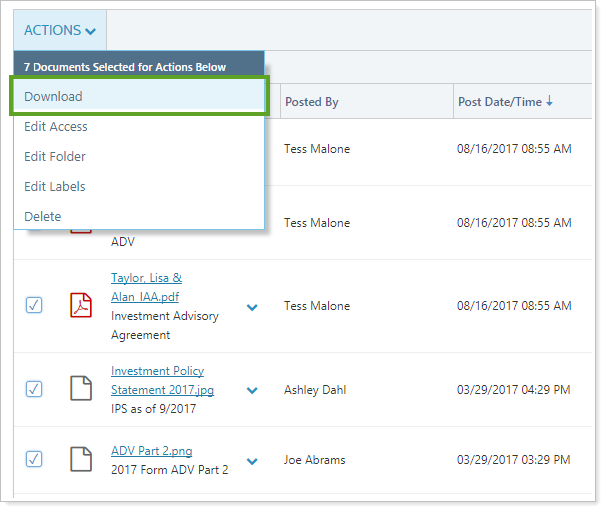
Select the check box next to all the files for download and, under Actions, click Download. This creates a zip file of all the selected files. This feature is available to you and your clients.
Note
You can download a maximum of 50 files at one time.
 New File Notifications for Clients
New File Notifications for Clients
If you choose to enable the document vault for your client portals, clients will see a vault very similar to yours. When you post a file to share with a client, not only does the client receive a notification email, but a red badge appears on the Documents tab in the client portal to alert the client to the presence of a new file.
It's easy for clients to identify new files, which are marked in bold and sorted to the top automatically.
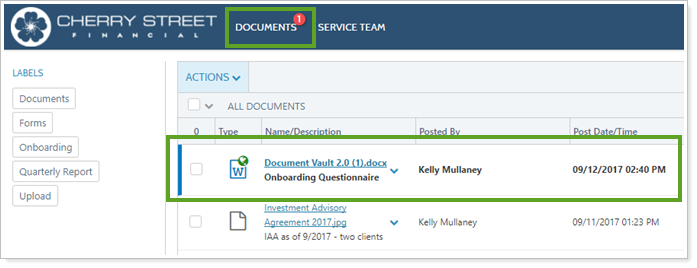
Additional improvements to the client portal document vault include:
-
One notification email per job. To save clients' inboxes, clients will only receive one notification email when you post multiple files at one time.
-
Control Client Views. You now control whether clients see folders and labels on their document vault page, in addition to the existing document posting controls.
Notes
-
Clients cannot add files to folders or apply labels to files.
-
Clients cannot delete or edit files from the document vault, even ones they upload.
-
-
Limited folder and label views. For added security, clients will only see folders and labels applied to files in their document vault.
Example
If a client only has documents in the Onboarding folder tagged with the Forms label, he will see only that folder and label. He will not see any other folders or labels applied to other files not visible in his document vault.
-
Clients upload and download multiple files at once. Just like for advisors, clients can now post and download multiple files at one time.
 Track Whether or Not a Client Has Seen a File
Track Whether or Not a Client Has Seen a File
If you have ever uploaded a file to clients and then needed to change it, you've wanted to know which clients have and haven't seen the original document. In the new document vault, each file has its own panel that provides access information and control. Under the Access tab, you see a list of all the clients who can access the file and which of those have downloaded the file.
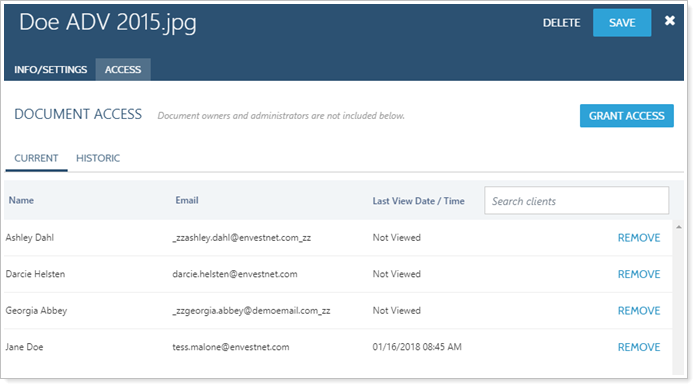
This panel is also one of the places where you can control which clients are allowed to have access to the file.
 Find Documents For List
Find Documents For List
The Find Documents For list acts like a Find Data For list for the document vault. When you select a client or Household from the list, you see only documents visible in their document vault—eliminating the need to view the portal as a client to confirm document delivery.

You can even use it to directly edit a Client panel or Household panel. Switch back to viewing all documents by clicking All Clients/Households in the Find Documents For list.
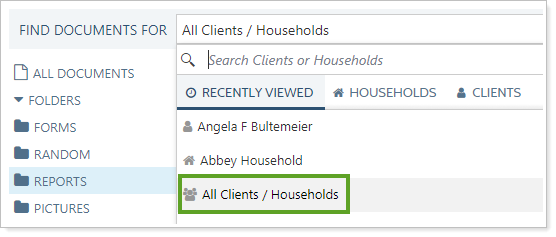
 Other Document Vault Enhancements
Other Document Vault Enhancements
-
Multiple clients Selected alert. On the Clients page, if you have multiple clients selected when you start to post a file, you'll receive an alert warning you that multiple clients are selected. This helps prevent inadvertently posting to more clients than you intend.

-
Edit File Name and Description. Change the name, description, folder membership, and labels applied for any document within the document.
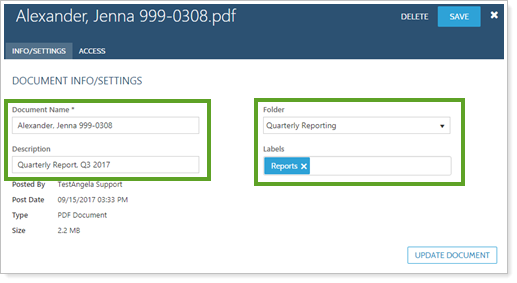
-
Receive Alerts When Clients Post Files. When clients upload several documents at once, you can set the New Document Posted by Client automated email to alert the appropriate parties in the firm.
How Do I Prepare For the New Document Vault?
After October 19, 2017, the first steps for using the document vault are:
-
Under Documents, click on the new Manage Folders page and set up folders.
-
Under Client Views, on the Document Vault page, enable client views for folders and/or labels.
Product Security
 Discontinued Support for Internet Explorer 10
Discontinued Support for Internet Explorer 10
In order to incorporate the latest features of modern Web browsers and to continue improving security, we have discontinued support for Internet Explorer 10 as of October 19, 2017.
important
Please take the time to upgrade to Internet Explorer 11 or later and ask your clients to do the same. We are committed to improving the products and services we offer, and we want you to get the most out of the new functionality we are developing.
If you are using Internet Explorer 10, you will find that Advisor View and Advisor Rebalancing are not accessible after October 19, 2017. If you have any questions, contact your Tamarac Service Team.
Dynamic Reports
 Annualized IRR Added to the Committed Capital Report
Annualized IRR Added to the Committed Capital Report
Annualization allows you to compare returns for different date periods greater than a year by converting the returns for each disparate period to a yearly rate. With this release, you can harness the power of annualization to compare internal rate of return (IRR) on the Committed Capital report. For example, you might evaluate annualized IRR for accounts that have held the same committed capital for a variety of different time periods.

On the dynamic and PDF Committed Capital report, you will see the following new Annualized IRR columns:
-
Annualized Net IRR for three separate date periods you designate
-
Annualized Gross IRR for three separate date periods you designate
To prevent confusion, the original columns called Net IRR and Gross IRR were renamed to Cumulative Net IRR and Cumulative Gross IRR. This name change will only apply to existing reports with those columns added where the name was not customized. It will not affect any IRR columns you changed to have a custom formatted name.
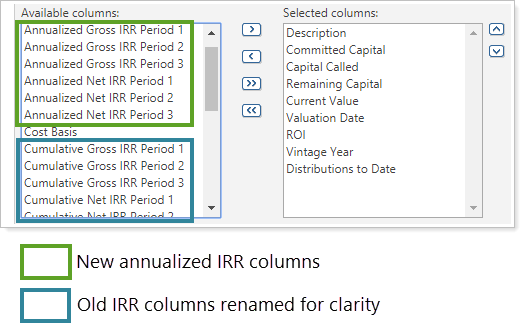
Evaluate Interval Performance for Selected Securities
The Interval Performance report helps you evaluate and troubleshoot performance for categories over a set date period. With this release, we added the option to evaluate the interval performance of any number of individual securities as well, allowing you to more effectively track down performance anomalies at the security level.

You might find this useful if, for example, you notice a performance discrepancy in an account or group. You can isolate what a specific security is doing and more quickly track down where the discrepancy may have come from.
Add Category-Level Returns to the Account Performance PDF Dashboard
You can now report on category-level returns for account performance on the PDF dashboard. You might choose to use this if you want to provide a simple table that lists performance by account or if you want to summarize security category performance with one line for each category.
Note
Each security category is listed on its own line in the PDF Dashboard. If the number of categories exceeds the available space in the dashboard module, all remaining categories will be summarized in a final list item called "Other."
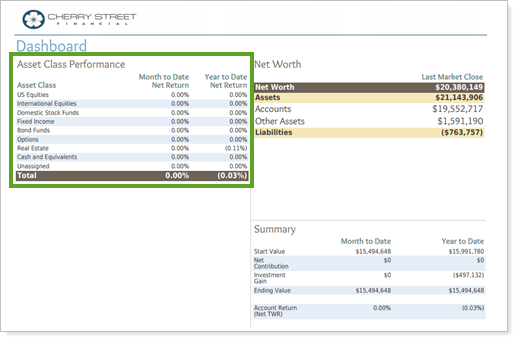
This change only applies to the Account Performance PDF Dashboard section. Full dynamic and PDF Account Performance reporting is not impacted.
To learn more about PDF templates, see Learn More About PDF Reports and Templates.
Toggle Unmanaged assets Display on Holdings Dashboard
When you're looking at a Holdings dashboard view, you may want to see only holdings you manage, while at other times you may want to see all holdings. For example, if you have a client with legacy assets that comprise a very large portion of the holdings, you can filter out those assets to see only your managed holdings at a glance.
The Include unmanaged assets option on the Holdings report dashboard now allows you to control when you see unmanaged assets.

For more information, see Include Unmanaged Assets and Holdings Report.
Integrations
 Two-Way Single Sign-On to eMoney for Advisors and Clients
Two-Way Single Sign-On to eMoney for Advisors and Clients
If you use eMoney as a financial planning tool, you'll be excited to learn that we further streamlined workflows by adding bidirectional single sign-on (SSO) access to our eMoney integration for you and your clients. For more information on this enhancement, see the press release.

The SSO from Tamarac to eMoney will be available shortly after the October 19, 2017 release. Please contact Account Management at TamaracAM@envestnet.com if you are interested in enabling the integration. eMoney will be releasing the SSO from eMoney to Tamarac in their November enhancement release.
Once enabled for your firm, you can turn on eMoney SSO for your clients through the client portal, giving your clients convenient access to their eMoney dashboard directly from Advisor View.
Single Sign-On to Tamarac through Okta
For users of the Okta Integration Network, you can now add Envestnet | Tamarac to your Okta dashboard for single sign-on access that provides ease of access to the Tamarac platform, more convenient logging in, and full security integrity. This integration complements our existing SAML 2 single sign-on offering.
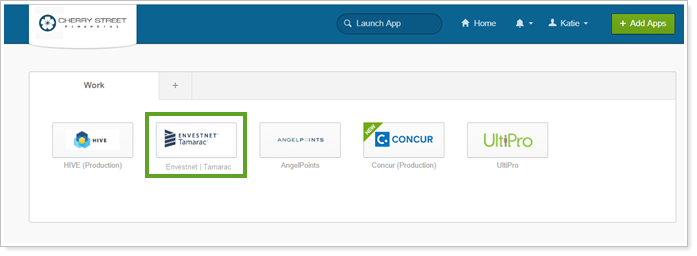
Duplicate Symbol Prevention for Symbols from Portfolio Center
In the rare instance that a security in Portfolio Center is renamed to a symbol that already exists in Advisor View, Advisor View will now rename the existing symbol, adding ".OLD" to the symbol name to prevent duplicate tickers.
Example
Security ABCDX exists in Portfolio Center and is synced with Advisor View. Additionally, Advisor View has a security called EFGHX that does not exist in Portfolio Center. If the symbol for security ABCDX is changed to EFGHX, on the next sync, the corresponding Advisor View symbol will be updated, creating a duplicate listing for EFGHX in Advisor View. To resolve this, .OLD is appended to the existing Advisor View security, which now is called EFGHX.OLD.

For any questions or concerns with sync, contact your dedicated Tamarac Support Team.
Bulk Reports and Uploads
Improved Bulk Report Processing and Status Tracking
Running bulk reports can be time consuming, especially for larger data sets. To save you time, we improved bulk report processing so that many Account Information and the Security Information bulk reports will show substantial performance improvements.
For those times when you do have to wait for a bulk report to finish, we added a status widget that gives you access to bulk report statuses anywhere in Advisor View.
As the report is running, the widget indicates the ongoing work by circling. When the bulk report finishes, you can download it directly from the widget by clicking the Succeeded link.

When you delete a completed report from the Bulk Report Status page, it is also deleted from the status widget list. Listings automatically drop off the widget at the end of each day.
Some Bulk Report Columns Renamed
To clarify the source of data in some bulk reports, we renamed some of the columns that appear in the Account - Aggregate section.
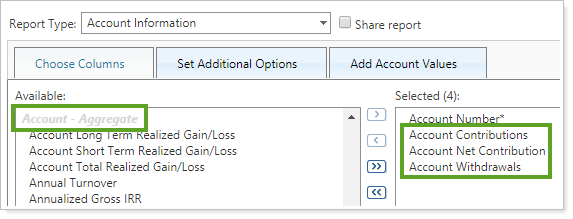
| Old Column Name | New Column Name |
|---|---|
| Contributions | Account Contributions |
| Withdrawals | Account Withdrawals |
| Net Contribution | Account Net Contribution |
You will see these column name changes in any of the bulk reports that include Account - Aggregate data. All data reported for these columns remains the same.
Uploaded Saved Searches Renamed
We renamed the custom uploaded saved search from Uploaded Search - Advisor View or Uploaded Search - Advisor Rebalancing to simply Uploaded Search in preparation for future improvements.
For more information about uploaded saved searches, see Saved Searches.
Billing
Determine Account Value on Day of Flow for Category Billing
If you bill by category, at times there may be many flows between categories. In this case, to ensure greater billing accuracy, you want to use the value on day of flow to calculate the billing rate tier.
Previously, for billing definitions that bill by category, you could only approximate the account value using the Adjusted beginning/ending value option. With this enhancement, you can adjust cash flow using the Value on day of flow option.
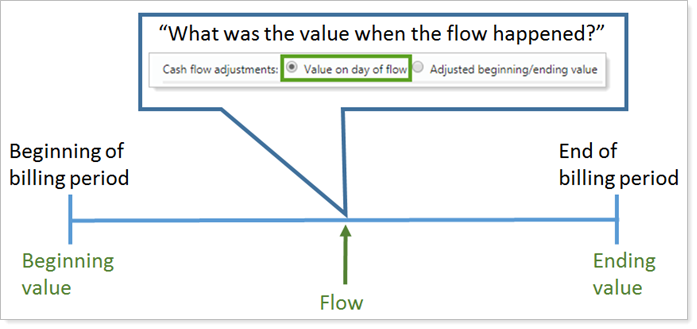
This option more accurately calculates the value of the account when a flow occurred, improving overall accuracy of your bill for category-based billing definitions.
For more information about billing definitions, see Billing Definitions.
Services
Suggestion Box Improvements for Submitting Feature Requests
Your feedback, suggested improvements, and new feature requests are important to us. We continually monitor this feedback so that we understand your needs and incorporate those needs into each release. Because your feedback is vital, we improved the Suggestion Box to make it easier to submit feedback and to provide a way for you to track the suggestions you submit.
Now, when submitting a feature request, you'll no longer have to type your personal information such as your email, phone, and company name. You can still attach files to your feature request in case you want to provide examples or screenshots to illustrate your comments.
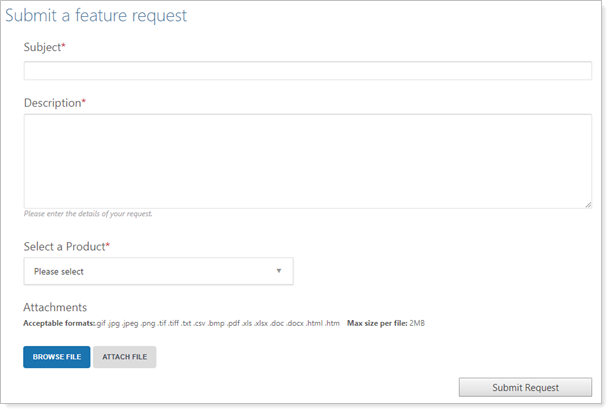
Once you've submitted the request, you can track the requests you and your firm have made over time, allowing you to see your feedback in action. Once a request has been resolved or incorporated, you'll receive an email about the change and your request will be removed from this list.
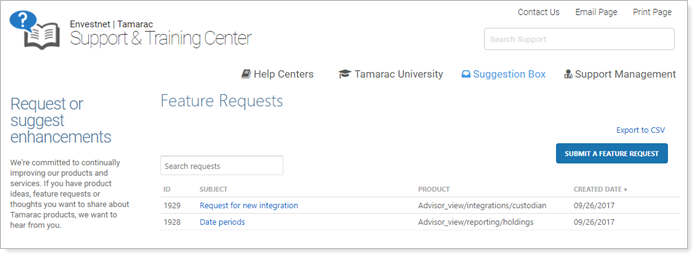
You can access the Suggestion Box by clicking the Suggestion Box link in the Support & Training Center.
Note
If you submitted feature requests before 2017, you won't see them listed. Only requests submitted in 2017 or later will show on the Feature Requests page. However, any requests you've submitted before 2017 are still being tracked to drive future product enhancements.
Learn More - Watch the Release Video


